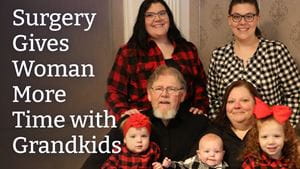
“It was getting to the point where I couldn’t enjoy anything.”
Mary White was nearly 50 years old when she had an episode with her heart that sent her to the emergency room.
Over the next two years, her health journey would take her through testing, medication, surgery, and – ultimately – a better life for her and her family. A key part of that was meeting Abdallah Bitar, MD, an interventional cardiologist with Rochester Regional Health.
While in her 30s and 40s, Mary had episodes of chest pain, but chalked it up to acid reflux or indigestion. Despite her mother passing away from congestive heart failure, Mary said she ignored the warning signs.
“I’d be walking with my daughters and I’d be like, ‘Woo, hold on, I’m getting a little flutter,’” Mary said. “They would say, ‘Mom, are you alright?’ I’d say, ‘I’m fine. It is not a big deal.’”
In October 2019, Mary was working at night when she experienced what she described as a “fluttering” sensation with her heart.
A trip to the emergency room concluded Mary had not had a heart attack, but doctors told her that her heart was not in good health. She had coronary artery disease.
“They found that one artery was 100 percent blocked and one was about 73 percent blocked,” Mary said. “They wanted to try to control it with medication.”
For about a year and a half after her emergency room visit, Mary and her providers managed her condition with medications. Still, she continued to have chest pain and difficulty breathing while she was active.
“I couldn’t enjoy the simple things like skipping down the road with my granddaughter or even playing outside,” Mary said. “Even pushing them on a swing got to be where it was just exhausting for me.”
In June 2021, Mary got a call from her cardiologist – saying Dr. Abdallah Bitar, who specialized in heart cases with 100 percent blockages, had arrived at Rochester Regional Health and would be able to help her.
Within a month, Mary was scheduled to undergo surgery. The procedure would relieve a chronically occluded artery – an artery that had been blocked for at least three months – and restore blood flow.
Once the surgery began, Dr. Bitar and the team at Sands-Constellation Heart Institute approached the affected artery from two directions and used ‘advanced techniques’ to open it up. Once the artery was reopened, the team placed three stents to support the artery and keep it open so blood could continue flowing in the usual direction.
“The reason why we do this procedure is basically for folks like [Mary],” Dr. Bitar said. “[They] have really difficult symptoms of chest pain with exertion that aren’t able to continue with medications…and their lifestyle is limited by their symptoms.”
Once out of surgery, Mary said the changes were almost instantly noticeable.
“The following week, I started walking a mile a day,” Mary said. “I felt great. Everyone said to me the next day, ‘My God, your coloring is awesome. You looked gray when you went in and you do not look gray anymore.’”
Best of all, Mary’s grandchildren are back to playing with her regularly. They are all very happy to have her active again.
“They can climb all over me as much as they want to and we can run around and we can play,” Mary said. “Everybody is very happy about this.”
According to Dr. Bitar, if Mary had not had surgery to open up that chronically occluded artery, her chest pain would have been a lifelong problem.
“She would have chest pain for the rest of her life,” Dr. Bitar said. “Unless a new medication comes about that can alleviate chest pain…she would probably have chest pain for quite a long time.”
Now that she is living a more vibrant life post-surgery, Mary has advice for people who may feel like something is off about their health but have not had a conversation with their primary care provider.
“If you start feeling a certain way, you are really the only advocate you have,” Mary said. “So if you feel like you are not right, if you feel something is wrong, then you should get it checked out.”